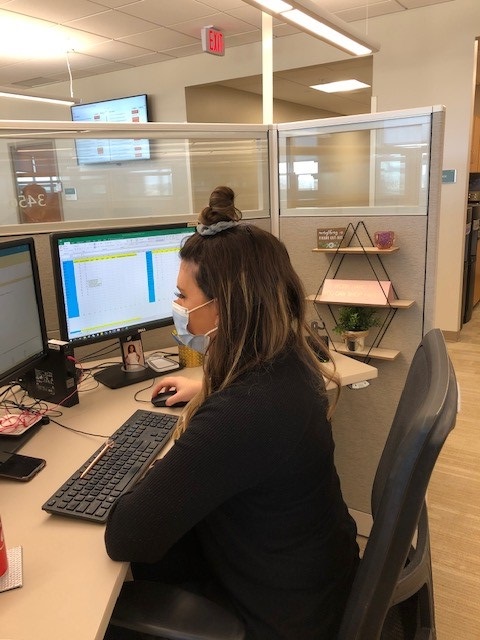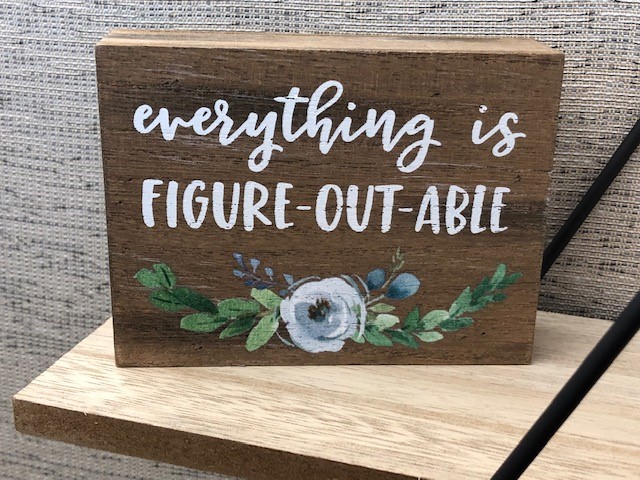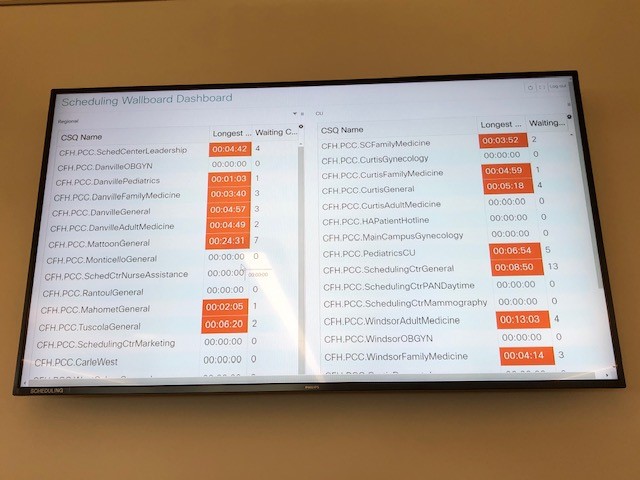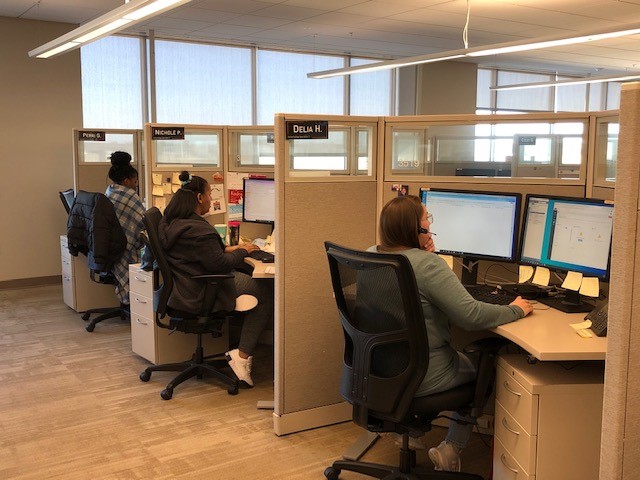If you walked into the Patient Contact Center, it resembles most other office settings with unassuming rows of computers and workstations and employees quietly talking on phones. Those local voices who answer the call represent first impressions, sounding boards and problem solvers to incoming callers.
Christine Scroggins, director of the Patient Contact Center, likens the work to being a duck on the water – calm on top and paddling for all it’s worth underneath. On any given day, a call center employee can take calls that include someone wanting a vaccine to a caller experiencing chest pains, someone wanting to schedule a physical exam or a person experiencing symptoms of mental depression.
on top and paddling for all it’s worth underneath. On any given day, a call center employee can take calls that include someone wanting a vaccine to a caller experiencing chest pains, someone wanting to schedule a physical exam or a person experiencing symptoms of mental depression.
Just recently, an employee’s first day on the job included taking a call from a man who wanted to schedule a physical exam, but he fell while talking. Thanks to his phone speaker being on, the call center employee told him an ambulance was on the way to his home to assist.
Add COVID-19 to the workload and the daily challenges increase immensely.
 In 2019, the average incoming call volume was 23,475 calls per week and now it is 41,775. In 2019, there were 58 employees handling the calls and thanks to a massive recruitment effort, hiring of new permanent staff, temporary staff and staff assisting from elsewhere in the system, there are 95 people assisting with Contact Center calls.
In 2019, the average incoming call volume was 23,475 calls per week and now it is 41,775. In 2019, there were 58 employees handling the calls and thanks to a massive recruitment effort, hiring of new permanent staff, temporary staff and staff assisting from elsewhere in the system, there are 95 people assisting with Contact Center calls.
To assist with the increasing call volume, Carle offers a new way to notify patients when vaccine is available in their area. Currently available for Champaign County only due to limited supply and eligibility guidelines, patients can elect to receive a phone call or text notification when new appointments open so they can easily schedule online via MyCarle or call us at (217) 902-6100 to schedule.
The need for new staff is ongoing and it takes a special person who can take 80 to 90 Primary Care calls on any given day, Scroggins said. Characteristics sought include individuals who excel at problem-solving in a fast-paced environment as well as someone who is a good listener, pays attention to detail, has good reading comprehension and is able to manage the conversation. Several openings are available and interested applicants may go to carle.org/careers and search for scheduling center under key words.
“We document every call while we have someone on the phone. As soon as call center employees hang up with one caller, another call is in their ear,” Scroggins said.
one caller, another call is in their ear,” Scroggins said.
Due to COVID-19’s call volume increase, the call center received help from Carle’s digital engagement and marketing teams who found new ways for patients to find assistance without calling the Patient Contact Center. There are two different online chat features – a symptom checker and vaccine eligibility guide.
Before placing a call to the Patient Contact Center, patients should consider the following:
Christine Scroggins, director of the Patient Contact Center, likens the work to being a duck on the water – calm
 on top and paddling for all it’s worth underneath. On any given day, a call center employee can take calls that include someone wanting a vaccine to a caller experiencing chest pains, someone wanting to schedule a physical exam or a person experiencing symptoms of mental depression.
on top and paddling for all it’s worth underneath. On any given day, a call center employee can take calls that include someone wanting a vaccine to a caller experiencing chest pains, someone wanting to schedule a physical exam or a person experiencing symptoms of mental depression.Just recently, an employee’s first day on the job included taking a call from a man who wanted to schedule a physical exam, but he fell while talking. Thanks to his phone speaker being on, the call center employee told him an ambulance was on the way to his home to assist.
Add COVID-19 to the workload and the daily challenges increase immensely.
 In 2019, the average incoming call volume was 23,475 calls per week and now it is 41,775. In 2019, there were 58 employees handling the calls and thanks to a massive recruitment effort, hiring of new permanent staff, temporary staff and staff assisting from elsewhere in the system, there are 95 people assisting with Contact Center calls.
In 2019, the average incoming call volume was 23,475 calls per week and now it is 41,775. In 2019, there were 58 employees handling the calls and thanks to a massive recruitment effort, hiring of new permanent staff, temporary staff and staff assisting from elsewhere in the system, there are 95 people assisting with Contact Center calls.To assist with the increasing call volume, Carle offers a new way to notify patients when vaccine is available in their area. Currently available for Champaign County only due to limited supply and eligibility guidelines, patients can elect to receive a phone call or text notification when new appointments open so they can easily schedule online via MyCarle or call us at (217) 902-6100 to schedule.
The need for new staff is ongoing and it takes a special person who can take 80 to 90 Primary Care calls on any given day, Scroggins said. Characteristics sought include individuals who excel at problem-solving in a fast-paced environment as well as someone who is a good listener, pays attention to detail, has good reading comprehension and is able to manage the conversation. Several openings are available and interested applicants may go to carle.org/careers and search for scheduling center under key words.
“We document every call while we have someone on the phone. As soon as call center employees hang up with
 one caller, another call is in their ear,” Scroggins said.
one caller, another call is in their ear,” Scroggins said.Due to COVID-19’s call volume increase, the call center received help from Carle’s digital engagement and marketing teams who found new ways for patients to find assistance without calling the Patient Contact Center. There are two different online chat features – a symptom checker and vaccine eligibility guide.
Before placing a call to the Patient Contact Center, patients should consider the following:
- Go to Carle.org to find for the latest COVID information and vaccine eligibility guidelines, the in-network insurance guide and how long it would take them to get the help needed at a Carle Convenient Care location.
- Visit MyCarle. Efforts to expand offerings for self-service include scheduling visits, sending questions to your provider and seeking your individual information about your health (printing immunization records is easy from here.) The Patient Contact Center is open from 7 a.m. to 6 p.m. Monday through Friday and the focus of each worker is first call resolution. Staff work the COVID phone lines seven days a week thanks to extra help.
Categories: Culture of Quality
Tags: Contact Center, COVID-19, Patient
